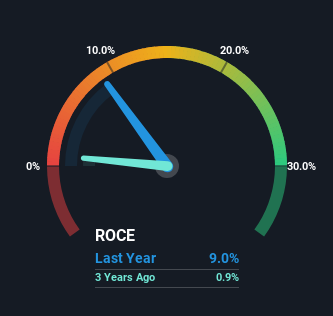- Saudi Arabia
- /
- Chemicals
- /
- SASE:2310
Investors Met With Slowing Returns on Capital At Sahara International Petrochemical (TADAWUL:2310)
What trends should we look for it we want to identify stocks that can multiply in value over the long term? Typically, we'll want to notice a trend of growing return on capital employed (ROCE) and alongside that, an expanding base of capital employed. Put simply, these types of businesses are compounding machines, meaning they are continually reinvesting their earnings at ever-higher rates of return. However, after briefly looking over the numbers, we don't think Sahara International Petrochemical (TADAWUL:2310) has the makings of a multi-bagger going forward, but let's have a look at why that may be.
Understanding Return On Capital Employed (ROCE)
Just to clarify if you're unsure, ROCE is a metric for evaluating how much pre-tax income (in percentage terms) a company earns on the capital invested in its business. Analysts use this formula to calculate it for Sahara International Petrochemical:
Return on Capital Employed = Earnings Before Interest and Tax (EBIT) ÷ (Total Assets - Current Liabilities)
0.09 = ر.س1.8b ÷ (ر.س23b - ر.س2.6b) (Based on the trailing twelve months to September 2023).
So, Sahara International Petrochemical has an ROCE of 9.0%. In absolute terms, that's a low return, but it's much better than the Chemicals industry average of 7.4%.
See our latest analysis for Sahara International Petrochemical

In the above chart we have measured Sahara International Petrochemical's prior ROCE against its prior performance, but the future is arguably more important. If you're interested, you can view the analysts predictions in our free report on analyst forecasts for the company.
What Can We Tell From Sahara International Petrochemical's ROCE Trend?
There are better returns on capital out there than what we're seeing at Sahara International Petrochemical. The company has employed 42% more capital in the last five years, and the returns on that capital have remained stable at 9.0%. Given the company has increased the amount of capital employed, it appears the investments that have been made simply don't provide a high return on capital.
What We Can Learn From Sahara International Petrochemical's ROCE
In conclusion, Sahara International Petrochemical has been investing more capital into the business, but returns on that capital haven't increased. Investors must think there's better things to come because the stock has knocked it out of the park, delivering a 126% gain to shareholders who have held over the last five years. However, unless these underlying trends turn more positive, we wouldn't get our hopes up too high.
If you'd like to know more about Sahara International Petrochemical, we've spotted 2 warning signs, and 1 of them is a bit unpleasant.
While Sahara International Petrochemical may not currently earn the highest returns, we've compiled a list of companies that currently earn more than 25% return on equity. Check out this free list here.
New: Manage All Your Stock Portfolios in One Place
We've created the ultimate portfolio companion for stock investors, and it's free.
• Connect an unlimited number of Portfolios and see your total in one currency
• Be alerted to new Warning Signs or Risks via email or mobile
• Track the Fair Value of your stocks
Have feedback on this article? Concerned about the content? Get in touch with us directly. Alternatively, email editorial-team (at) simplywallst.com.
This article by Simply Wall St is general in nature. We provide commentary based on historical data and analyst forecasts only using an unbiased methodology and our articles are not intended to be financial advice. It does not constitute a recommendation to buy or sell any stock, and does not take account of your objectives, or your financial situation. We aim to bring you long-term focused analysis driven by fundamental data. Note that our analysis may not factor in the latest price-sensitive company announcements or qualitative material. Simply Wall St has no position in any stocks mentioned.
About SASE:2310
Sahara International Petrochemical
Owns, establishes, operates, and manages industrial projects related to chemical and petrochemical industries in the Kingdom of Saudi Arabia.
Flawless balance sheet with reasonable growth potential.
Similar Companies
Market Insights
Community Narratives




